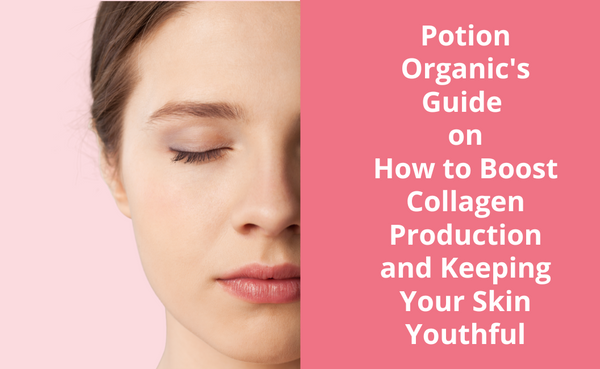How to increase collagen in your body naturally?
What is collagen?
Collagen is a structural protein found in connective tissues throughout the body, and it plays an essential role in maintaining skin health.
Collagen provides structure and strength to your skin, helping keep it firm, smooth, and hydrated.
Type I collagen has been identified as the most beneficial type of collagen for the skin due to its abundance of amino acids like proline and glycine.
Our body's amazing ability to create collagen by transforming ingested proteins into the vital amino acids needed for collagen production can be enhanced through targeted dietary measures.
By incorporating a combination of nutrient-rich foods and dietary supplements, you can optimize your natural capacity to construct new sources of this powerful protein.
How does collagen work for skin health?
Collagen helps to form essential fibres in your dermis, the middle layer of skin that contains most of the body’s sweat glands and hair follicles. It helps create a matrix of support for new cells, allowing them to reproduce and fill in areas where wrinkles or other signs of ageing are present. Collagen also helps with wound healing, providing structure so that damaged tissue can repair itself quickly.
Finally, collagen plays an important role in keeping skin hydrated by helping retain water molecules in the epidermis which keeps it healthy and supple.
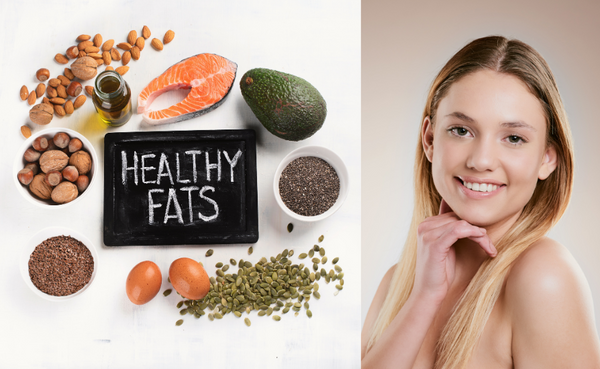
Amino acids and omega-3 fatty acids, fish and shellfish can help you reach the main source of collagen peptides. These peptides work to stimulate your body's production of collagen - a vital protein known best for its positive impacts on skin health.
Will taking oral collagen supplements help my skin?
Evidence from reviewed studies suggests that taking collagen supplements -both Type I and Type III can boost collagen production and improve skin moisture, elasticity, and hydration when orally administered. Additionally, these types of collagen have been found to reduce the wrinkling and roughness of the skin with no reported side effects.
Supplementation with marine collagen peptides combined with plant-derived antioxidants may offer a dual approach, providing both skincare benefits as well as systemic redox effects which protect our bodies from oxidative stress.
Tabasheer or bamboo extract is an excellent natural option to supplement your skincare routine for a radiant complexion. Beans meanwhile deliver essential amino acids and protein that play a role in collagen synthesis - perfect if you're looking to glow from the inside out!
Which type of collagen is best for skin health?
Type I collagen has been identified as the most beneficial type of collagen for the skin. It is the most abundant type of collagen in the body and contains amino acids like proline and glycine which are essential for healthy skin.
Collagen plays an essential role in maintaining skin health and can be increased naturally by eating a healthy diet rich in antioxidants and vitamins A, C, and E; exercising regularly; limiting sugar intake; getting plenty of sleep; and avoiding excessive sun exposure.
Additionally, evidence from reviewed studies suggests that both Type I and Type III collagen supplements can improve skin moisture, elasticity, and hydration when orally administered without any reported side effects.
If you’re looking to increase your body’s natural production of collagen or supplement it with oral products for better skin results, make sure to consult with a medical professional first.
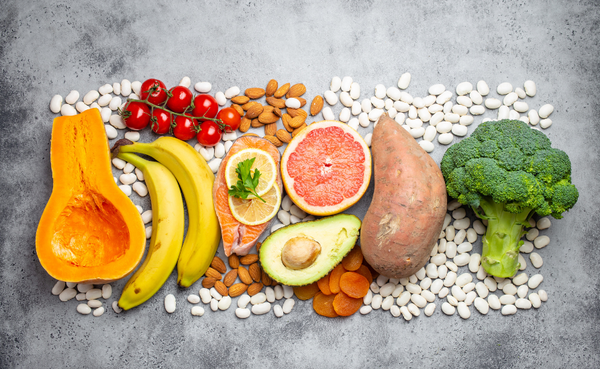
Eating citrus fruits will help with making sure enough you are getting enough vitamin C, whereas avocados are rich sources of vitamin E which supports the availability of vitamin C decreases oxidative damage.
Collagen-rich foods: animal & plant foods
Best sources of Collagen type I :
- Fish
- Egg whites
- Soy products
- Dairy products
- Dark, leafy greens like spinach and kale.
Sources of other types of collagen:
- Type II: chicken, beef, duck, fish, eggs and dairy products.
- Type III: nuts and seeds.
- Type IV: fruits and vegetables.
- Type V: whole grains such as oats, quinoa and wheat germ.
By understanding the different types of collagen available in foods and supplements—and how they work to support skin's health—you can make informed decisions about your diet to help promote healthy skin!
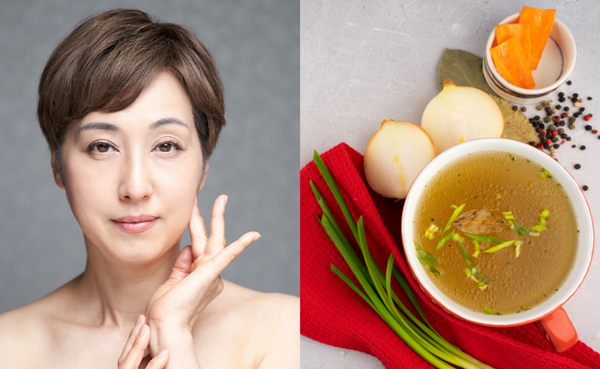
High-quality collagen rich bone broth can be made at home by simmering animal bones with vegetable - a tasty treat for a glowing skin.
How to increase collagen in the skin naturally through food?
Eating collagen-rich foods can help increase the amount of collagen in your body.
1. Eat more foods that are rich in Vitamin C, such as oranges, mineral-rich fruits strawberries, kiwis, and veggies bell peppers, Brussels sprouts and broccoli. Intaking enough Vitamin C helps to create the cross-links between collagen molecules that give skin its strength and elasticity.
2. Incorporate bone broth into your diet regularly. Bone broth is high in collagen and gelatine which can help to boost levels of collagen in the body.
3. Consume foods that contain minerals like copper, manganese and zinc. Copper helps to activate enzymes involved in the production of collagen; manganese is essential for protein synthesis; and zinc helps with collagen absorption from food sources. Foods such as peanuts, oysters, lentils and mushrooms are all good sources of these minerals.
4. Increase your intake of omega-3 fatty acids by eating fatty fish like salmon or mackerel or taking a supplement if necessary. Omega-3s help to reduce inflammation which in turn can help the body naturally produce more collagen.
Studies suggest that, for maximum benefit, our bodies need high-quality fish collagen and fish might be the answer. Marine collagen has proven to be particularly accessible by our bodies which makes it ideal for improving the endogenous production of this essential protein.
5. Add fruits and vegetables with high antioxidant content to your diet such as blueberries, spinach and tomatoes. Antioxidants protect against oxidative damage which can otherwise degrade collagen levels over time by preventing free radical damage caused by UV rays or toxins in our environment from impacting our cells directly.
Consuming the above foods provides a bevvy of benefits, improve skin elasticity, anti-ageing effects and relief from joint pain. In short: eat these for a younger-looking you!
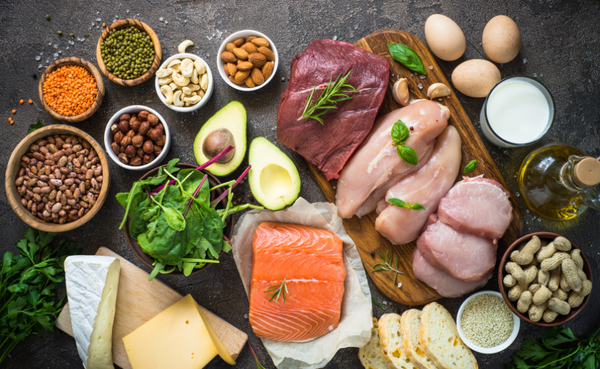
Collagen-rich food / dietary collagen boosts the body's natural collagen production and supports overall health benefits resulting not only in supple skin but also healthy bones.
How to stimulate collagen production in the skin naturally?
Transform your skin naturally with these 5 simple tips that promote collagen production.
Instead of turning to expensive beauty treatments, try nourishing your body from the inside out.
- Start by consuming foods rich in antioxidants and loaded with vitamins A, C, and E, which can help increase collagen production.
- Incorporating regular exercise into your routine can also help promote healthy cell growth throughout the body.
- Limiting sugar intake is key, as it can lead to hyperglycemia, which accelerates collagen breakdown.
- Make sure to prioritize sleep to reduce stress hormones that can break down collagen in the skin.
- Lastly, beware of the sun's harmful rays, which can damage collagen and prematurely age the skin. Invest in these natural practices to keep your skin glowing and youthful.
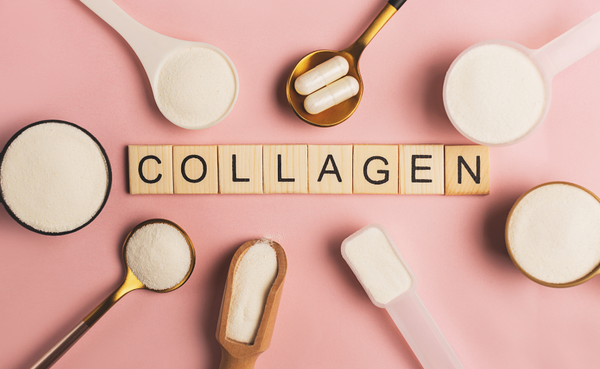
Varying collagen intake via collagen supplement and protein-rich foods can boost the collagen that the body produces and stabilize existing collagen protein structure.
What ingredients when applied topically increase collagen production in the skin?
In order to increase collagen production in the skin, several ingredients can be applied topically.
Vitamin C
Vitamin C is known for its antioxidant properties and ability to stimulate the production of new collagen fibres.
Hyaluronic acid
Hyaluronic acid helps to protect existing collagen while aiding in moisture retention.
Retinol
Retinol /Vitamin A has been shown to increase cell turnover, which can help with firmness and elasticity in the skin as well as stimulate collagen production.
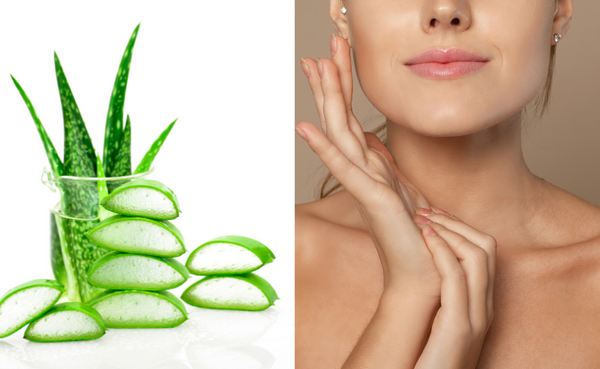
Bakuchiol
Bakuchiol is a natural ingredient derived from the babchi plant which has been found to be as effective as retinol in boosting collagen.
Aloe Vera
Aloe vera gel and juice has also been known to be beneficial in the production of collagen. It contains a compound called polysaccharides which helps to promote collagen synthesis.
These ingredients, when topically and combined with a healthy lifestyle and diet, can help to boost your skin’s natural collagen production for an overall younger-looking complexion.
Spirulina
Spirulina is also a great ingredient for boosting collagen production. It contains high levels of antioxidants and vitamins A, C, and E which can help boost the skin’s natural collagen production. When applied topically, spirulina helps to brighten and even tone the complexion while protecting against environmental toxins that can break down collagen over time.
Other ingredients that can help to boost collagen
Other topical ingredients that promote collagen synthesis include niacinamide, peptides, q10 enzyme and ceramides.
Finally, peptides can help to repair damaged collagen and stimulate new fibres to grow. When used together, these ingredients can provide powerful anti-ageing and skin-brightening benefits.
When used together these ingredients provide powerful anti-ageing benefits by increasing cellular turnover resulting in firmer and more youthful-looking skin.

Vitamin C is indispensable for forming essential amino acids and maintaining collagen structure and integrity. These acids are building blocks of skin and are essential in maintaining epidermal thickness of the outer layers therefore are essential as a part of your skin anti-aging strategies.
How can I boost collagen production on a Vegan diet?
Plants contain proteins that can produce similar effects to collagen found in animals. To provide vegan support for the body's natural production of this essential protein, plant-based foods containing important amino acids such as glycine, lysine and proline should be consumed.
High collagen animal food sources such as hydrolyzed collagen, unfortunately, cannot be supplemented by plant sources.
However, plants food sources such as tofu, black beans, pistachio nuts, peanuts, cashews and pumpkin, sunflower and chia seeds can support your body to produce more collagen naturally. Furthermore, modern technology has enabled the creation of a unique type of vegan supplement made by combining human DNA with yeast or bacteria through genetic modification - providing an alternative source for those seeking dietary sources from plants alone!
What about herbal supplements?
Gotukola, bala and ashwagandha are exceptional herbs known to contribute and help produce collagen in our bodies. When consumed regularly, these remarkable ingredients have been said to provide anti-ageing benefits as well as reduce joint pain - leading the skin towards its much-needed elasticity for a subtle glow.
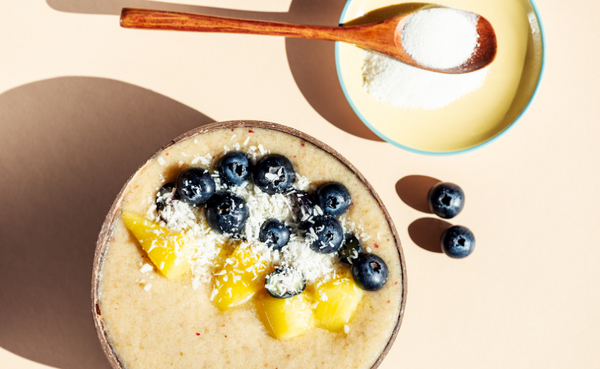
Collagen is an essential protein for our body beyond just the skin. It helps to ensure healthy bones, hair growth, blood vessels, joints, flexible tendons and muscles as well as provides support to the digestive system, and connective tissue and helps to regulate hormones in the body. Lack of it results in weakening muscles, weak bones, sagging skin and skin aging.
With age human body produces less collagen naturally which leads to wrinkles, crepey skin and other skin issues. Staying healthy doesn't just increase one's outward beauty; it is also essential for sustainably functioning internal organs. Make sure to prioritize a regular diet and physical activity routine in order to stay fit and look great!
Applying collagen topically can temporarily give the skin a more youthful and hydrated look is not as effective as boosting it naturally through the diet.
Get the youthful and glowing skin you deserve! Check out Potion Organic's Guide on how to boost collagen production - giving your complexion a powerful health kick. Added bonus - 7 Easy Collagen Boosting Recipes Click here to get your guide now.

